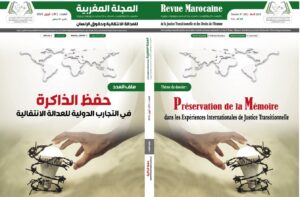د.حفيظ اركيبي، “معرفة الحقيقة وحفظ الذاكرة بين استبعاد المحاسبة واعتذار الدولة في ضوء تجربة الانصاف والمصالحة بالمغرب”
د.حفيظ اركيبي، “معرفة الحقيقة وحفظ الذاكرة بين استبعاد المحاسبة واعتذار الدولة في ضوء تجربة الانصاف والمصالحة بالمغرب”
Knowing the Truth and Preserving Memory Between the Exclusion of Accountability and the state’s Apology
In light of the Experience of Equity and Reconciliation in Morocco
ملف الصحافة عدد: 13/2022 – الايداع القانوني: 2023PE0013-العدد (01) / ابريل 2023.
ملف العدد:حفظ الذاكرة في التجارب الدولية للعدالة الانتقالية – الناشر:المركز المغربي للعدالة الانتقالية ودراسة التقارير الدولية.
ملخص:
تحاول هذه الدراسة استحضار تجربة هيئة الإنصاف والمصالحة بالمغرب، لإبراز العلاقة بين حفظ الذاكرة والحق في معرفة الحقيقة واعتذار الدولة، والوقوف عند بعض الإشكالات وبعض الإكراهات والنقاشات السياسية والحقوقية المصاحبة لها، لاسيما ما يتعلق بجدلية المساءلة والمسؤولية وتعذر الحقيقة القضائية بعد استبعاد المحاسبة الفردية والجدل الذي رافق مطلب تقديم الدولة للاعتذار عما ارتكبه “الجلادون” في حق الضحايا من انتهاكات جسيمة لحقوق الإنسان خلال أربعة عقود من التوظيف السياسي للعنف في أبشع أشكاله لإدارة صراع سياسي أضاع على المغرب سنوات من التنمية والتقدم والازدهار.
ومن أهم النتائج والتوصيات التي استقرت عليها الدراسة أن ضمان الوصول غير المقيد إلى المحفوظات الوثائقية وعدم إتلاف السجلات أو تحديثها وتحديد المسؤولين عن ارتكاب الانتهاكات تحت سقف “العدالة الانتقالية” يبقى ضروريًا للغاية ولاحترام “الحقّ في معرفة الحقيقة” وهو جزء أساسي لحفظ الذاكرة بغض النظر عن شكل وطبيعة الاعتذار، وكلها عناصر أساسية مرتبطة ببعضها البعض ارتباطا وثيقا وتمتد إلى حق المجتمع ككل وحق الأجيال اللاحقة في معرفة ما حدث من انتهاكات الماضي لمنع حدوثها على الأقل في المستقبل، مع وجوب توخي اليقظة من محاولات التقليل من شأن الفظائع الماضية أو إنكارها من جهة ومن التلاعب بالذكريات الجماعية لأغراض أجندات سياسية داخلية أو خارجية من جهة أخرى، بما يستدعي بذل جهود ذؤوبة وحازمة للتغلب على القيود التي أعاقت عمل هيئة الانصاف والمصالحة وتحقيق العدالة في نهاية المطاف.
الكلمات المفتاحية: “العدالة الانتقالية بالمغرب”، “حفظ الذاكرة”، “الحقّ في معرفة الحقيقة”، “اعتذار الدولة”، “انتهاكات جسيمة لحقوق الإنسان”، “الضحايا والجلاد”، “التوظيف السياسي للعنف”، “هيئة الإنصاف والمصالحة”، “سنوات الجمر والرصاص”، “الضحايا”، الجلاد”.
Abstract :
This study attempts to evoke the experience of the Equity and Reconciliation Commission in Morocco, to highlight the relationship between preserving memory, the right to know the truth, and the state’s apology, and to stand at some problems, some constraints, and the accompanying political and human rights debates, especially with regard to the controversy of accountability and responsibility and the impossibility of judicial truth after excluding individual accountability and the controversy that accompanied it. The demand for the state to apologize for the gross violations of human rights committed by the “torturers” against the victims during four decades of political exploitation of violence in its worst forms to manage a political conflict that has wasted years of development, progress and prosperity on Morocco.
Among the most important findings and recommendations of the study is that ensuring unrestricted access to the documentary archives, not destroying or updating records, and identifying those responsible for committing violations under the roof of “transitional justice” remains absolutely necessary for respecting the “right to know the truth”, which is an essential part of preserving memory regardless of The form and nature of the apology, all of which are essential elements closely related to each other and extend to the right of society as a whole and the right of subsequent generations to know what happened in the past to prevent them at least in the future, while being vigilant against attempts to belittle or deny past atrocities on the one hand and on the other hand Manipulating collective memories for the purposes of internal or external political agendas on the other hand, which requires persistent and determined efforts to overcome the restrictions that hindered the work of the Equity and Reconciliation Commission and ultimately achieve justice.
Keywords : “transitional justice in Morocco”, “preserving memory”, “the right to know the truth”, “state apology”, “gross violations of human rights”, “victims and executioners”, “political exploitation of violence”, “equity and reconciliation commission” “,” Years of embers and bullets “,” Victims “,” Executioner”.
المجلة المغربية للعدالة الانتقالية وحقوق الانسان
مجلة علمية محكمة فصلية متخصصة في دراسات وأبحاث حول العدالة الانتقالية وحقوق الإنسان، تصدر عن المركز المغربي للعدالة الانتقالية ودراسة التقارير الدولية

